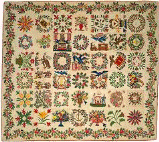Textile Society of America

Textile Society of America: Symposium Proceedings
Date of this Version
2020
Document Type
Article
Citation
Published in Hidden Stories/Human Lives: Proceedings of the Textile Society of America 17th Biennial Symposium, October 15-17, 2020. https://digitalcommons.unl.edu/tsaconf/
doi: 10.32873/unl.dc.tsasp.0109
Abstract
It is proposed that detailed knowledge of the textile production sequence currently carried out by Aymara weavers of the Altiplano of Tarapac (northern Chile) constitutes an important reference to link material and immaterial aspects and generate indicators with which to address pre-Hispanic textile production in domestic sites, the locations where fabrics would have been produced and used. This research is conceptually framed by the anthropology of technology, which considers material production as a social act. The recording of textile production processes (cha ne op ratoire) was carried out using an ethno-archaeological approach to build a bridge between the present—with known material and immaterial conditions—and the past. Work with contemporary producers allowed us to generate indicators of the different stages of a textile manufacturing sequence related to landscape, particular places, and mobile and immobile material components.
These analytic methods were archaeologically tested in the Huancarane domestic site textile collection (Camarones Valley, northern Chile). This enabled us to recognize stages carried out on the site, two distinct manufacturing processes, and the fabrics used and discarded on the site. We were able to trace technical relations with other cultural developments in the region and approximate their chronological and cultural relationships: in short, to improve our understanding of textile production processes and the social dynamics in which these objects have been embedded.
On this basis, we evaluate the pertinence and utility of the analytical tools developed in this research, as well as the multiple aspects in which current textile production provides information for understanding the past.
Included in
Art and Materials Conservation Commons, Art Practice Commons, Fashion Design Commons, Fiber, Textile, and Weaving Arts Commons, Fine Arts Commons, Museum Studies Commons


Comments
Copyright © 2020 Bárbara Cases